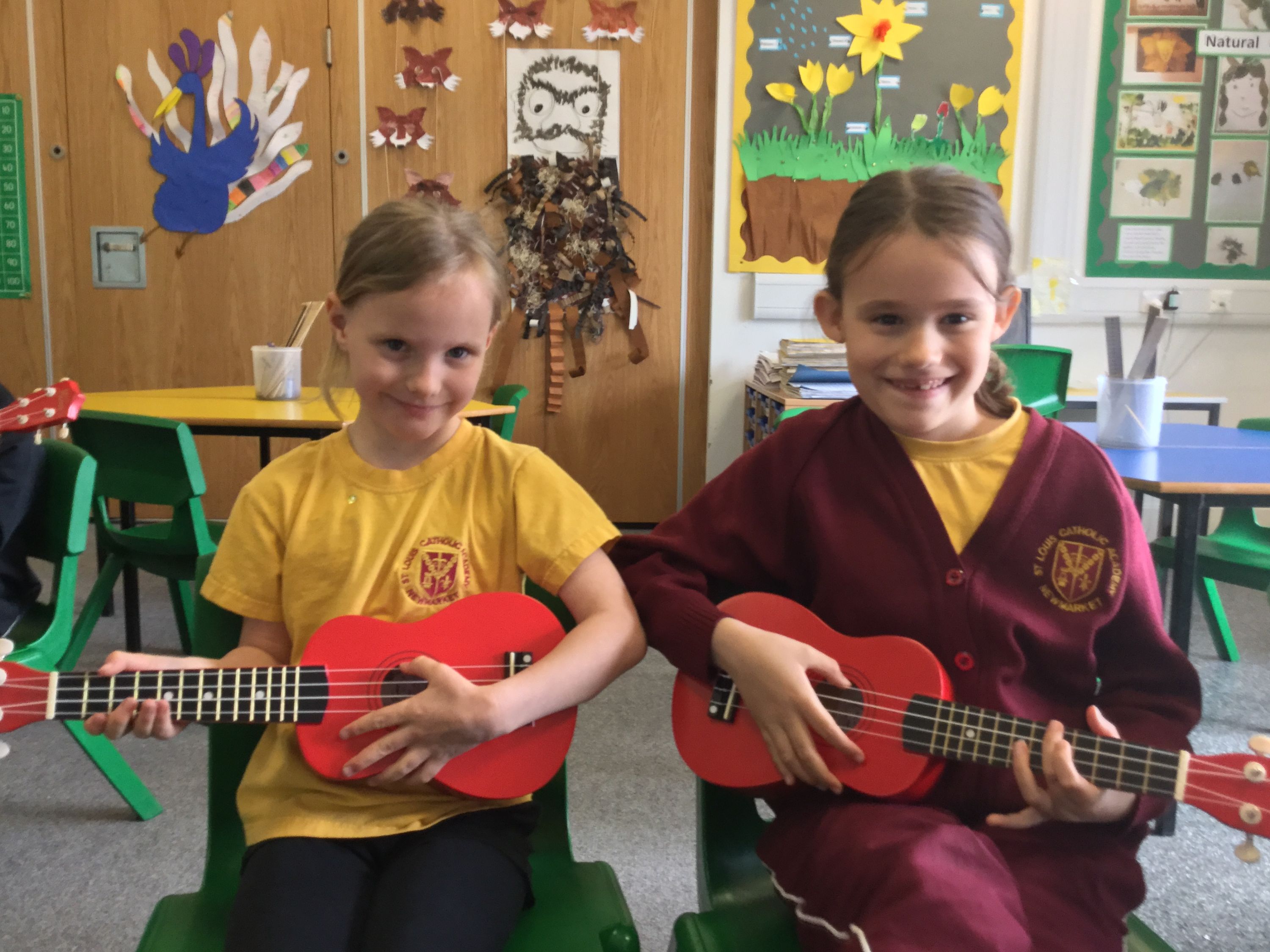Music
Our Prayer and Liturgy is an Opportunity to Sing and Experience Music
In school, all children are exposed to liturgical music. This is music specifically composed for use in Catholic worship. This type of music plays a role in enhancing our music in school and Mass and takes various forms, such as hymns, chants, and anthems, each serving distinct purposes within the liturgy.
Music
Intent
Music is an essential part of life; integral in the development of the whole person. We believe that the opportunity to engage in musical experiences is crucial for the development of the whole child. Learning music develops all aspects of a child’s learning. These abilities are directly transferable to other areas of the curriculum, allowing children to flourish, and will be invaluable in their future life. At our school, children have access to music through regular class lessons, worship, workshops as well as extra opportunities such as music lessons, choir and wider performance opportunities with other schools and in the local community.
Through playing, singing, creating and performing, children will develop confidence, communication, thinking and creative skills and improve their emotional well-being. All children will be able to experience a sense of achievement and pride. It is our vision that every child adopts an understanding and love of music which they can carry with them for the rest of their lives.
Implementation
The principal categories of the National Curriculum are taught to each Year Group. A specialist Music teacher provides 45-minute lessons to all children. In Key Stage 2 children have the opportunity to learn an instrument through music lessons with an experienced music tutor. They have the chance to learn the keyboard, ukulele and recorder. Music is a foundation subject within in the National Curriculum and encompasses the following key areas which, when taken together, all contribute towards the steadily increasing development of musicianship, singing, listening, composing and performing/ Instrumental Performance
At St Louis we ensure this when we:
- Perform, listen to, review and appraise music across a range of historical periods, genres, styles and traditions which reflects the diverse community in which we live.
- Learn to sing and to use voices, to create and compose music on their own and with others, have the opportunity to learn a musical instrument.
- Understand and explore how music is created through the building blocks of music: pitch, duration, dynamics, tempo, timbre, texture, structure and appropriate musical notations.
- Develop performance expertise through musical opportunities such as: end of year concerts, assembly performances, mass, choir, Nativity performances and Easter performance.
- Annual Talent Competition at the Summer Fair.
Impact
The impact reflects what we have achieved from our intent, and we can see it by the array of activities and opportunities children have:
- Christmas performances and performance to peers and local community.
- Key Stage 2 perform a musical in the Summer Term.
- Pupils regularly perform at Prayer and Praise, concerts, assemblies, fares and in church.
- Whole school theatre visits (Reception to Year 6).
- Key Stage 2 choir with community performances.
- Visiting musicians present workshops and the opportunity to hear live music, for example drum workshop.
We teach music using a specialist teacher and all children are offered the opportunity to learn an instrument as part of lessons. We also partner with a singing tutor for some year groups.
We use a range of instruments to help children learn in their weekly music lessons. Over their time in school, children in every class learn to play percussion instruments, keyboard and ukulele.
There is also a Ukulele Club that is led by the music teacher.
KS1
Percussion and rhythm
Spring:
- Playing games and activities that uses a steady beat – marching, body percussion etc.
- Musical rhythm notation will be practised this way to improve the students understanding of quavers, crotchets, minims and semibreves.
- Opportunities to individually perform in a classroom setting, as well as group performances.
- Singing along with their instrument
Summer:
- Students to transfer their rhythmic skills learned during the spring term to develop basic skill of playing handheld percussion instruments (djembe, triangle etc.)
- Enhance their ambidextrous co-ordination
- Opportunities to individually perform in a classroom setting, as well as group performances.
- Begin using a variety of dynamics
- Singing along with their instrument
LKS2
Keyboard and sight reading
Spring:
- Begin learning basics of keyboard over theory including pitch, scales, triads and begin sightreading staves. Incorporate previously learned theory
- Develop knowledge of and recognise different timbres and instrument families
- Listen to significant musical pieces/ composers to develop musicology
- Singing along with their instrument
Summer:
- Advance knowledge surrounding notation/sheet music (dotted notes etc)
- Begin creating short compositions
- Singing along with their instrument
- Listen a variety of genres and understand their characteristics
- Opportunities to individually perform in a classroom setting, as well as group performances.
UKS2
Ukulele/Recorder and music theory
Spring:
- Class performances on ukulele
- Pick up on re-learning recorder
- Sightreading staves
- Advance knowledge surrounding notation/sheet music (dotted notes etc)
- Begin learning about musical periods
- Listen to significant musical pieces/ composers to develop musicology
Summer:
- Opportunities to individually perform in a classroom setting, as well as group performances, either on ukulele, recorder and/or vocals
- Write and perform short compositions as part of a small group/ensemble
- Listen to a variety of genres and understand their characteristics
- Learn the country of origin/association with instruments to learn about different cultures within music
The yearly overview for teaching of music is attached below:
Autumn Term units : Pulse and Voice
Spring Term: Rhythm and Pitch
Summer Term: Technology Structure and Form & 20th Century music

